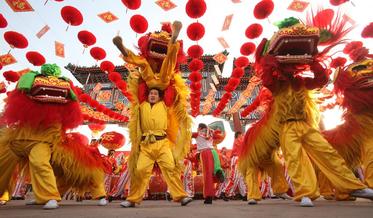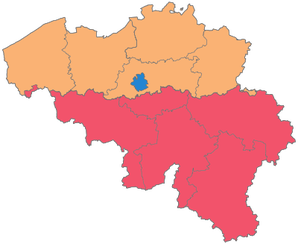 Starting at 2pm Gent will experience a great spectacle in the historic centre, full of dance and music, with a traditional Asian parade to highlight. The colourful parade starts at the City hall and passes through the Kammerstraat, Langemunt and Graslei. Chinese communities annually celebrate the Spring festival and it is for a third year running that a Chinese New Year Parade has been arranged in Belgium. Last events in Brussels and Dinant aroused great public interest. This February, Ghent will host the parade and is excited to welcome many guests, tourists and inhabitants. It is understandable that the parade will be held in Ghent: Ghent is a vivid city full of culture, with a beautiful historical centre. But Ghent also has active ties with China. For many years the city has been in partnership with the City of Weihai and is involved in the European City network Eurocities that actively promotes EU-China cooperation. The city also cooperates with the Flemish-Chinese Chamber of Commerce. And the Chinese Geely Golding is the proud owner of the VOLVO factory in Ghent, a big plant in the Port of Ghent. This third ‘Chinese New Year Parade’, the start of the year of the dog, is organised by the Chinese community in Belgium, together with the support of the Chinese Embassy and the city of Ghent. Program:
1 Comment
 Entering in Belgium, expatriates may face a culture shock in Belgium, especially when they first arrive. Most notably, there are two main languages and two very different cultures all wrapped up in one fairly small country. Languages and Culture The northern half of Belgium is occupied by the Flemish, who speak Dutch, whereas the southern half is mostly occupied by the French-speaking Walloons. This is a result of the troubled history of the region that is now Belgium, which has been invaded, occupied and colonised many times. The country as it exists today has only been around since the mid-1800s. The differences don’t stop at language, and can be striking if one travels north into the Flemish areas or south into Wallonia. The buildings are different, the people are different, and the two communities generally have different traits, so it can feel like two countries divided in half. The general perception is that the Flemish are more industrious and serious; they tend to be quieter and more reserved. The Walloons are known to be more relaxed, expressive and easy-going, and outwardly emotional. It’s not unusual for Belgians to switch languages during a conversation, or for someone to ask a question in French and get an answer in Dutch. It is also quite common for locals to start a sentence in English and switch to French halfway, in order to articulate what they want to say quickly. The capital (Brussels) is officially bilingual, so signage is in both French and Dutch. In reality, the majority of people in Brussels speak French most of the time. That being said, the practical reality is that the language barrier in Belgium usually isn’t as big a deal as expats might fear. Most Belgians, at least in Brussels, seem to be quite adept with languages and can speak English in addition to their French and Dutch. It is a good idea to learn some Dutch or French, depending on which area an expat is going to be living in and the type of work an expat will do. But with Brussels being such a cosmopolitan city, other languages are frequently heard, and there are those who don’t speak a word of French or Dutch but still manage to live and work in the country. Greeting in Belgium In many respects the customs and etiquette in Belgium are fairly typical of the wider Western European region; Belgians are generally quite reserved and usually greet people they don’t know as friends with a handshake. In the French-speaking community a kiss on the cheek is often common among people who already know each other. Cultural norms in Belgium Belgium has a fairly liberal society that is tolerant of different races, cultures and religions. In Brussels, particularly, expats will see people of almost every nationality, race or religion going about their daily lives in close proximity. One thing that some expats may find shocking is the legalisation of prostitution in Belgium, as in the Netherlands. Each big city has its own red light area, complete with scantily clad women in the windows, like in Amsterdam. Smoking is very common in Belgium. As a country famed for its beer; alcohol is also widely available, more so than in other countries. Most bars, cafés, restaurants and sandwich shops happily sell beer; it is even possible to buy beer in McDonalds. Beer is also considerably cheaper than in some other countries – a can of beer is often cheaper than a can of Coke the same size. Officially it’s illegal to drink on the street, but in practice, as most bars have an outside area for smokers, this doesn’t seem to be enforced, and it’s not uncommon to see people drinking beer in the park on a warm afternoon. When eating out, tipping is not viewed as mandatory, but a tip is always welcomed. Expats should note that all Belgian citizens, immigrants, expats and tourists are required to carry some form of identification at all times in Belgium. |
Archives
March 2019
Categories |
http://www.furnishedapartmentsghent.com
 RSS Feed
RSS Feed